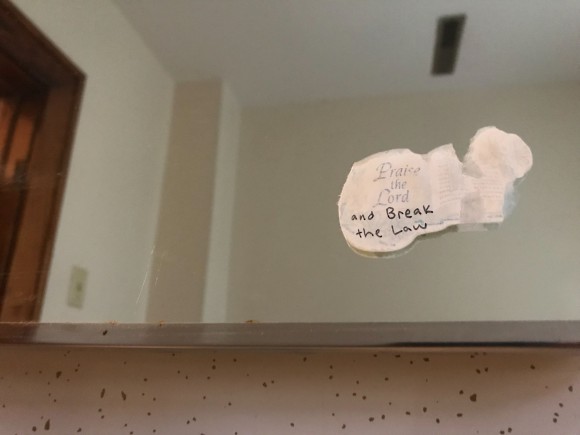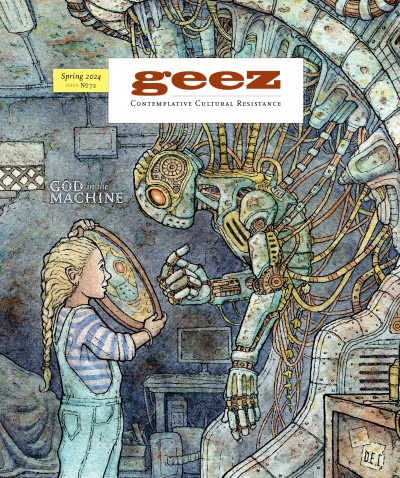Call for pitches: Geez 56 Breaking the Law

As seen at the Sugar Creek Midwest Catholic Worker Gathering, fall 2019. Credit: Kateri Boucher
Deadline November 10, 2019
“We need to engage in whatever nonviolent actions appeal to us. There is no act too small, no act too bold. The history of social change is the history of millions of actions, small and large, coming together at critical points to create a power that governments cannot suppress. We find ourselves today at one of those critical points.” – Howard Zinn
“The decision to engage in civil disobedience is challenging not just what the symbol represents, but also the laws that are set up to protect it.” – Bree Newsome, after pulling down the South Carolina Confederate flag in 2015
In countries founded on the legality of slavery and Indigenous massacres, we begin naming the complex relationships between law, violence, and power. Historically, engaging with laws through breaking them has been part of the arc that moves us towards justice. In this issue we hope to unpack the nuances of breaking the law, and the choices we do (or don’t) make in the process.
Here are some questions and prompts to consider as you think about pitching a piece.
- For what are you willing to go to jail?
- What acts of law-breaking have inspired you?
- Where did these laws come from in the first place? Whose laws are they? Who do they serve?
- How is breaking the law perceived differently based on who did it? Who is criminalized and who is revered?
- How do identities of race, class, gender, sexuality, and ability show up in our decisions around law-breaking?
- In a time when people protest via hashtags and newsfeeds, does putting your body on the line still say something? Is it a dying form of protest or is it all the more important?
- When breaking the law is an act of justice, do you stick around and wait for the cops to arrest you? Or do you take off?
- White folks often have greater freedom to take the risks of direct action. Is civil disobedience a way white people can do ally work? Or does it play further into a white saviour mentality?
- (How) is celebrity culture replicated in movements with direct action “heroes”? What behind-the-scenes work is required when members of our community choose to break the law? Does the distribution of work become gendered?
- In 1960, Black folks sat down at the lunch counters in Greensboro, North Carolina to protest racial discrimination. What laws today must we break simply because the laws themselves are unjust?
- “You cannot serve God and money.” “Give to Caesar what is Caesar’’s.” Where is our obedience? Whose allegiance do we pledge? What happens when God’s law comes in contradiction with governmental law?
- On Palm Sunday, Jesus and his followers put on a great public, theatrical parade culminating in the civil disobedience of turning over the money tables. What does this look like in today’s context?
- Emily Grossman said recently in a declaration from climate scientists, “We believe that the continued governmental inaction over the climate and ecological crisis now justifies peaceful and non-violent protest and direct action, even if this goes beyond the bounds of the current law.” What does civil disobedience look like in the context of climate catastrophe? How are actions of survival becoming more criminalized? How do we resist this?
Notes about submissions
We want long-form journalism, personal stories of transformation, short bursts of feelings, and nuggets of inspiration. Pick your aspect of the topic and expand with personal experience, researched wisdom, or spiritual insight.
In a great pitch, you describe the story, explain how it’s a perfect fit for Geez, list the sources you’ll consult, and state why you’re the best person to write it. Please include a brief bio and where you live. Ideally, pitches are a page or less. Note that if you send us 20 pages, we likely will not be able to read it.
1. Longer non-fiction pieces, length: 650 or 1300 words
We’re looking for creative non-fiction essays, investigative articles or research-based pieces on the topic above. While a reference to your personal experience is welcome, readers need wisdom from other sources as well (interviews, books, articles, theologians, social-justice activists, academics, and moms and dads). Pitches should be one page, touch on the wider context of your topic and name at least one other source you will be consulting. If your pitch is accepted you’ll usually have three to four weeks to complete the piece.
2. Flash non-fiction, length: 50-350 words
These are short, personal experiences or insights. Your piece should capture a moment that illuminates a larger issue or convey a feeling familiar to us all. This is a chance to bring hope, insight, emotion, and connection to readers. Think of it as a snapshot with words.
3. Photos/illustrations:
Consider the topic above and send original photographs (i.e. you took the photo) or illustrations that provoke or pacify, animate or incite. Or, if you know of a photographer or illustrator who can deliver an awesome photo essay or series of drawings and is willing to get big play in a premium little magazine for a modest honorarium, please pass this pitch along.
4. Poems:
In each issue we aim to publish 2 or more poems, often with one poem per page. Poems may relate closely to the theme, or not. We’ll look at them all.
Tips for pitches:
The Geez project is a discussion among people of faith seeking social justice. Our readers and writers express this through art, activism (a creative critique of those in power and the structures that keep them there, the promotion of alternative practices that subvert such powers), contemplation, and a more-grounded, interconnected approach to living.
Additional info:
Before pitching, please read our guidelines for writers. Ideally we would like to respond personally to every piece of correspondence we receive. But given the number of submissions we receive – and having tried to respond to all – we realize it is just not possible. If you do not hear back from us within four weeks of the deadline assume that we were unable to use your submission.
Deadline for pitches: November 10, 2019
We look forward to seeing what you send!
Sincerely,
Lydia Wylie-Kellermann, managing editor
Kateri Boucher, associate editor
Lucia Wylie-Eggert, art director
Send pitches, manuscripts and images to
Geez Editors,
email: stories [at] geezmagazine [dot] org
mail: Geez magazine, 1950 Trumbull, Detroit, MI 48216 USA
To join our Writers List, click HERE.


Start the Discussion